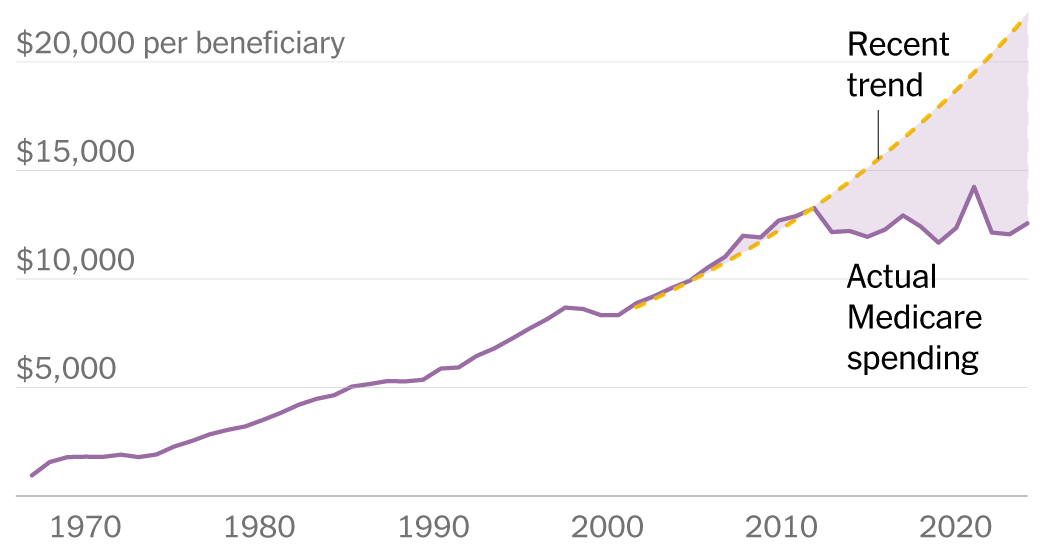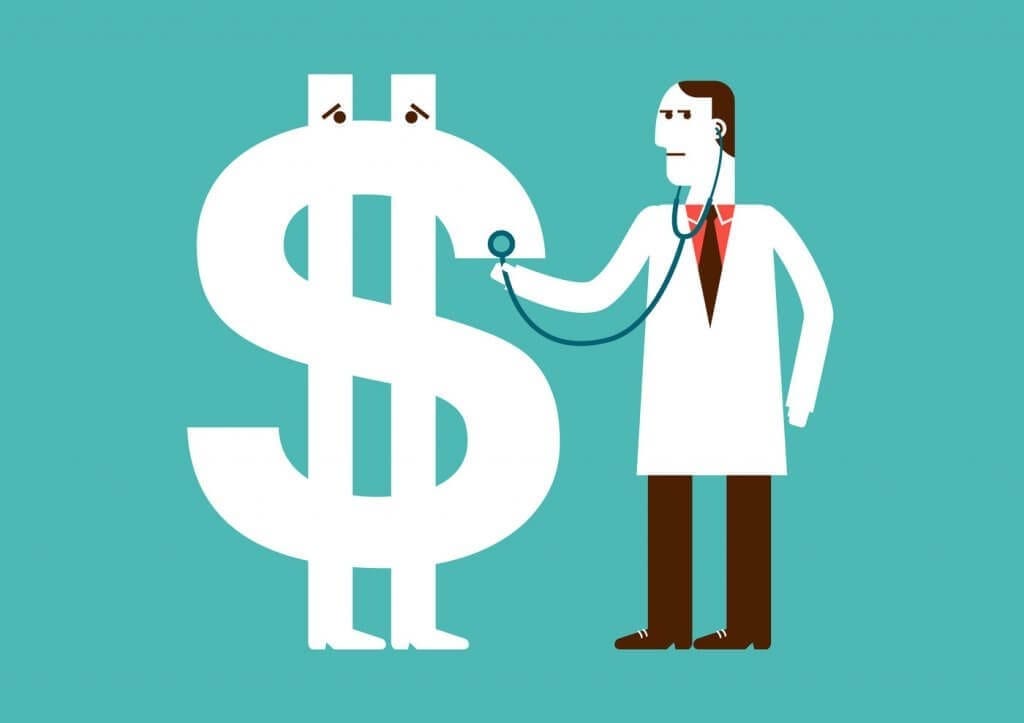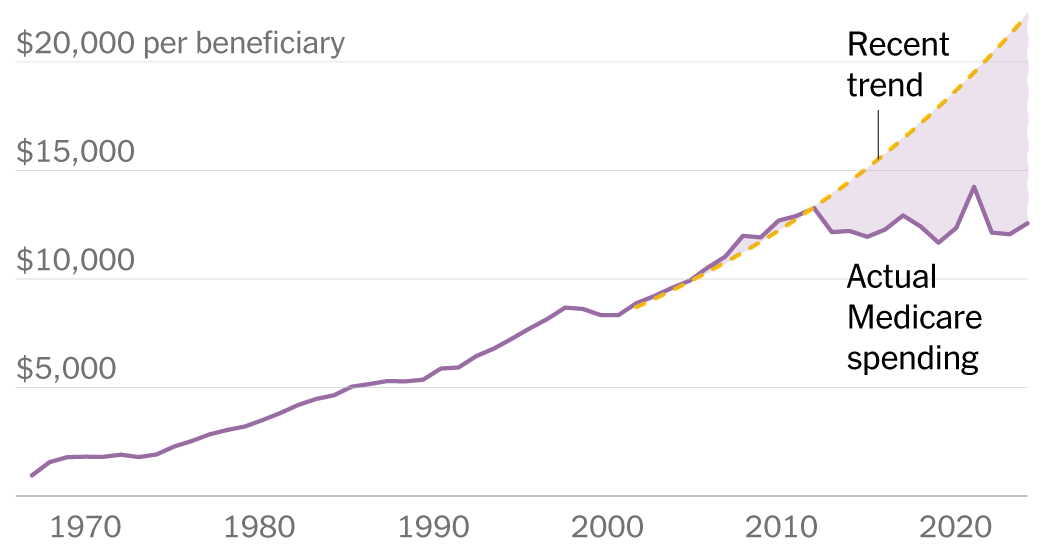the health strategist . institute
institute for
strategic health transformation
& digital health
Joaquim Cardoso MSc.
Chief Research & Editor,
Chief Strategy Officer (CSO), and
Independent Senior Advisor
September 6, 2023

What is the message?
Medicare spending in the United States has unexpectedly slowed down in recent years, which has had significant implications for the federal budget.
- This slowdown in spending per Medicare beneficiary has been a departure from historical trends and has resulted in substantial cost savings for the government.
- However, the reasons behind this slowdown are not entirely clear, and there is uncertainty about whether it will continue in the future.
There are various factors that may have contributed to the slowdown in Medicare spending, including
- changes in Medicare policy,
- the availability of more cost-effective medications, and
- increased efficiency in the healthcare system.
While these cost savings have been beneficial for federal spending, they have also raised concerns about the potential impact on healthcare outcomes and access to treatments for Medicare beneficiaries.
While the current slowdown in Medicare spending has provided short-term budgetary relief, it does not eliminate the long-term challenges posed by an aging population and the growing number of Americans relying on the program.
Therefore, the uncertainty surrounding the future of Medicare spending remains a significant issue with high stakes for policymakers.

One page summary
The central message of the article revolves around the unexpected decline in Medicare spending in the United States and its profound impact on the federal budget.
Traditionally, runaway Medicare costs had been a key concern for the government, but recent trends indicate a significant shift.
Spending per Medicare beneficiary has nearly stabilized over the past decade, defying historical patterns.
The article begins by highlighting the importance of this trend, describing it as perhaps the most critical development in the federal budget over the last two decades.
Experts and scholars are perplexed by this phenomenon, and the reasons behind the slowdown remain shrouded in mystery.
While some reductions can be attributed to legislative changes, such as the Affordable Care Act and budget deals in 2010 and 2011, a significant portion of the savings is unexplained and classified as “technical adjustments” related to changes in public health and medical practices.
Several factors are explored as potential contributors to the spending slowdown.
- One plausible explanation is the widespread use of cost-effective medications for conditions like high cholesterol and blood pressure among older Americans, leading to fewer heart attacks and strokes.
- The absence of groundbreaking medical treatments and pharmaceutical innovations in recent years has also played a role in curbing Medicare expenditures.
- Additionally, the healthcare system appears to have become more efficient,
– with medical providers exercising caution in adopting unproven therapies and
– delivering care in less expensive settings.
Experts interviewed in the article suggest that recent federal policies and choices made by private insurers have made healthcare professionals and administrators more cost-conscious, which has contributed to the budgetary relief.
However, it’s worth noting that while reduced heart attacks and strokes have improved public health, the lack of major medical breakthroughs has slowed down improvements in life expectancy for seniors, and some patients may have been denied certain treatments due to cost containment measures.
The article also touches upon the impact of the COVID-19 pandemic, suggesting that Medicare may ultimately save money due to the higher mortality rates among older Americans with other costly illnesses.
If Medicare had continued its historical growth trajectory, federal spending would have been significantly higher, emphasizing the importance of the spending slowdown.
Despite the temporary budgetary relief, the article underscores that Medicare remains a critical concern for policymakers, especially with an aging population and a growing number of Americans relying on the program.
Analysts worry that the current trend may be an aberration, and future developments, such as
- the discovery of effective Alzheimer’s drugs or
- shifts in healthcare priorities, could lead to a resurgence in Medicare spending.
The article concludes by emphasizing the high stakes associated with the uncertainty surrounding the future of Medicare spending.
Source: “A Huge Threat to the U.S. Budget Has Receded. And No One Is Sure Why.”, New York Times,
https://www.nytimes.com/interactive/2023/09/05/upshot/medicare-budget-threat-receded.html
Names mentioned
David Cutler: professor of health policy and medicine at Harvard, who helped the Obama White House develop the Affordable Care Act.
Melinda Buntin: who measured the trend as a deputy assistant director at the Congressional Budget Office and now studies it as a professor at Johns Hopkins.
Joshua Gordon: director of health care policy at the Committee for a Responsible Federal Budget, a group that supports deficit reduction.
Sherry Glied: dean of the Wagner School of public service at N.Y.U., who has evaluated several proposed long-term options for managing Medicare’s finances.












